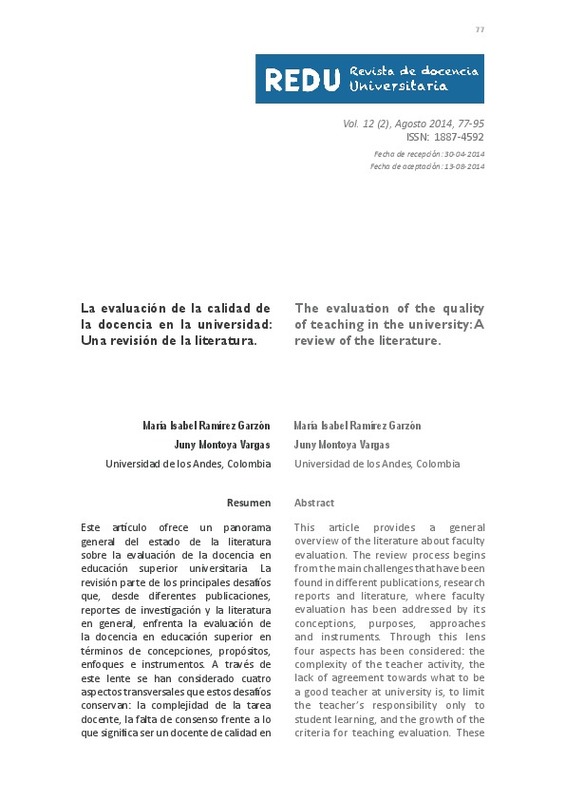Alles, M. A. (2002). Desempeño por competencias: evaluación de 360o. Ediciones Granica SA.
Astin, A. W. (1991). Assessment for Excellence: The Philosophy and Practice of Assessment and Evaluation. New York: American Council on Education.
Bain, K. (2007). Lo que hacen los mejores profesores universitarios. Universitat de València.
[+]
Alles, M. A. (2002). Desempeño por competencias: evaluación de 360o. Ediciones Granica SA.
Astin, A. W. (1991). Assessment for Excellence: The Philosophy and Practice of Assessment and Evaluation. New York: American Council on Education.
Bain, K. (2007). Lo que hacen los mejores profesores universitarios. Universitat de València.
Bass, R. J. (2000). Technology, evaluation, and the visibility of teaching and learning. New Directions for Teaching and Learning, 2000(83), 35-50.
Biggs, J. (1999). Calidad del aprendizaje universitario. (3ra Ed.). Madrid, España: Narcea S.A. Ediciones.
Boyer, E. L. (1990). Scholarship Reconsidered: Priorities of the Professoriate. Princeton, N.J.: Carnegie Foundation for the Advancement of Teaching.
Braskamp, L. A. (2000). Toward a more holistic approach to assessing faculty as teachers. New directions for teaching and learning, 2000(83), 19-33.
Buller, J. L. (2013). Best practices in faculty evaluation: a practical guide for academic leaders. San Francisco, Calif.: Jossey-Bass
Chism, N. V. N. (2004). Characteristics of effective teaching in higher education: Between definitional despair and certainty. Journal on Excellence in College Teaching, 15 (3), 5-36.
Entwistle, N., Skinner, D., Entwistle, D., & Orr, S. (2000). Conceptions and beliefs about "good teaching": An integration of contrasting research areas. Higher Education Research and Development, 19(1), 5-26.
Feldman, K. A. (1997). Identifying exemplary teachers and teaching: Evidence from student ratings. In R. P. Perry and J. C. Smart (Eds.), Effective teaching in higher education: Research and Practice (pp. 368-395). NY: Agathon Press.
Felten, P. (2013). Principles of good practice in SoTL. Teaching and Learning Inquiry: The ISSOTL Journal, 1(1), 121-125.
Fenstermacher, G., & Richardson, V. (2005). On making determinations of quality in teaching. The Teachers College Record, 107(1), 186-213.
Fox, M. A. & Hackerman, N. (Eds). (2002). Evaluating and improving undergraduate teaching in science, technology, engineering, and mathematics. National Academies Press.
Hanushek, E. A. (2005). Economic outcomes and school quality (Education Policy Series, Volume 4). Paris: International Institute for Educational Planning.
Jennings, P. A., & Greenberg, M. T. (2009). The prosocial classroom: Teacher social and emotional competence in relation to student and classroom outcomes. Review of educational research, 79(1), 491-525.
Johnson, T. D., & Ryan, K. E. (2000). A comprehensive approach to the evaluation of college teaching. New Directions for Teaching and Learning, 2000(83), 109-123.
Kember,D. (1997). A reconceptualisation of the research into university academics' conceptions of teaching. Learning and Instruction, 7, 255± 275.
Kember, D. (1998). Teaching beliefs and their impact on students' approach to learning. In B. DART & G. BOULTON-LEWIS (Eds.), Teaching and learning in higher education (pp. 1± 25). Melbourne: Australian Council for Educational Research.
Kember, D. & Leung, D. (2008). Establishing the validity and reliability of course evaluation questionnaires. Assessment & Evaluation in Higher Education, 33:4, 341-353.
Marczely, B. (1992). Teacher evaluation: research versus practice. Journal of Personnel Evaluation in Education, 5(3), 279-290.
McKeachie, W. J. (1987). Instructional evaluation: Current issues and possible improvements. The Journal of Higher Education, 58(3), 344-350.
Meeus, W., Van Petegem, P., & Engels, N. (2009). Validity and reliability of portfolio assessment in pre-service teacher education. Assessment & Evaluation in Higher Education, 34(4), 401-413. doi: 10.1080/02602930802062659
Murillo, F. J. (2007). Evaluación del desempeño y carrera profesional docente. Un estudio comparado entre 50 países de América y Europa. Santiago: OREALC/UNESCO
Murphy, T., MacLaren, I., & Flynn, S. (2009). Toward a summative system for the assessment of teaching quality in higher education. International Journal of Teaching and Learning in Higher Education, 20(2), 226-236.
O'Hanlon, J., & Mortensen, L. (1980). Making Teacher Evaluation Work. The Journal of Higher Education, 51(6), 664-672.
Ory, J. C. (2000). Teaching Evaluation: Past, Present, and Future. New Directions for Teaching and Learning, 2000(83), 13-18. doi: 10.1002/tl.8302
Palomba, C. A. & Banta, T. W. (2001). Assessing student competence in accredited disciplines: pionnering approaches to assessment in higher education (1st Ed.). Canada: Stylus Publishing.
Pratt, D. D. (2002). Good teaching: One size fits all? New Directions for Adult and Continuing Education, 2002(93), 5-16.
Prosser, M. & Trigwell, K. (1999). Understanding learning and teaching: The experience of higher education. Buckingham: SRHE/Open University Press.
Prosser, M., Trigwell, K. & Taylor, P. (1994). A phenomenographic study of academics'conceptions of science learning and teaching. Learning and Instruction, 4, 217± 232.
Rueda, M. (2009). La evaluación del desempeño docente: consideraciones desde el enfoque por competencias. Revista electrónica de investigación educativa, 11(2), 1-16.
Samuelowicz, K. (1999). Academics' educational beliefs and teaching practices. Unpublished doctoral dissertation, Faculty of Education, Grif® th University, Australia.
Samuelowicz, K.& Bain, J.D. (1992). Conceptions of teaching held by academic teachers. Higher Education, 24, 93± 111.
Sarramona, J. (2003). Los indicadores de la calidad de la educación. In Trabalho apresentado no IX Congresso Interuniversitario de Teoria de la Educación, San Sebastián.
Scott, D. E., & Scott, S. (s.f). Effective University Teaching and Learning.
Shulman, L. S. (2004). Teaching as community property: Essays on higher education. P. Hutchings (Ed.). San Francisco: Jossey-Bass.
Spooren, P., Brockx, B., & Mortelmans, D. (2013). On the Validity of Student Evaluation of Teaching The State of the Art. Review of Educational Research, 83(4), 598-642.
Stake, R. E., & Cisneros-Cohernour, E. J. (2000). Situational Evaluation of Teaching on Campus. New Directions for Teaching and Learning, 2000(83), 51-72.
Stake, R. E., Contreras P., G., & Arbesú, I. (2011). Evaluando la calidad de la Universidad, particularmente su Docencia. Paper presented at the III Coloquio Internacional de la RIIED, Bogotá.
Theall, M., & Franklin, J. (2000). Creating Responsive Student Ratings Systems to Improve Evaluation Practice. New Directions for Teaching and Learning, 2000(83), 95-107.
Uniandes (Producer). (2011). M. Scriven: El estado del arte de la evaluación de los profesores: fallas en la valoración de los pares, valoraciones de los estudiantes y mejoras del aprendizaje como base para la evaluación. RIIED: III Coloquio internacional. Retrieved from http://www.youtube.com/watch?v=wo0dYwcIO3E&list=PL057113F01F9F84DC&index=2&feature=plpp_video
[-]








